
Martin Van Buren was the eighth president of the United States, serving from 1837 to 1841. A primary founder of the Democratic Party, he served as New York's attorney general and U.S. senator, then briefly as the ninth governor of New York before joining Andrew Jackson's administration as the tenth United States secretary of state, minister to Great Britain, and ultimately the eighth vice president from 1833 to 1837, after being elected on Jackson's ticket in 1832. Van Buren won the presidency in 1836 against divided Whig opponents. Van Buren lost re-election in 1840, and failed to win the Democratic nomination in 1844. Later in his life, Van Buren emerged as an elder statesman and an anti-slavery leader who led the Free Soil Party ticket in the 1848 presidential election.
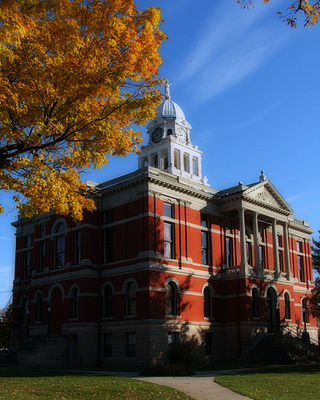
Eaton County is a county in the U.S. state of Michigan. As of the 2020 United States Census, the population was 109,175. The county seat is Charlotte. The county was organized in 1837 and was named for John Eaton, who was Secretary of War under U.S. President Andrew Jackson, making it one of Michigan's Cabinet counties. Eaton County is included in the Lansing-East Lansing, Metropolitan Statistical area in Central Michigan.

Lewis Cass was a United States Army officer and politician. He represented Michigan in the United States Senate and served in the Cabinets of two U.S. Presidents, Andrew Jackson and James Buchanan. He was also the 1848 Democratic presidential nominee. A slave owner himself, he was a leading spokesman for the doctrine of popular sovereignty, which at the time held the idea that people in each U.S state should have the right to decide on whether to permit or prohibit slavery, believing in the idea of states' rights.
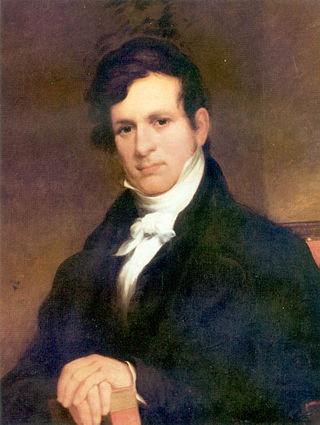
John Henry Eaton was an American politician and ambassador from Tennessee who served as U.S. Senator and as U.S. Secretary of War in the administration of Andrew Jackson. He was 28 years, 4 months, and 29 days old when he entered the Senate, making him the youngest U.S. Senator in history.

The Territory of Michigan was an organized incorporated territory of the United States that existed from June 30, 1805, until January 26, 1837, when the final extent of the territory was admitted to the Union as the State of Michigan. Detroit was the territorial capital.

John Branch Jr. was an American politician who served as U.S. Senator, Secretary of the Navy, the 19th Governor of the state of North Carolina, and was the sixth and last governor of the Florida Territory.
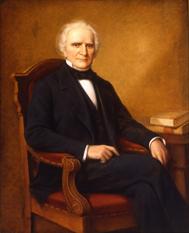
Samuel Delucenna Ingham was an American politician who served as a U.S. Representative and the U.S. Treasury Secretary under President Andrew Jackson.
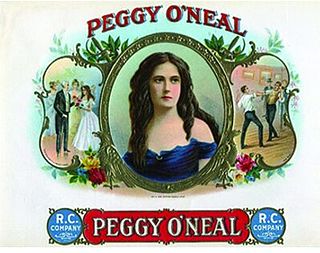
The Petticoat affair was a political scandal involving members of President Andrew Jackson's Cabinet and their wives, from 1829 to 1831. Led by Floride Calhoun, wife of Vice President John C. Calhoun, these women, dubbed the "Petticoats", socially ostracized Secretary of War John Eaton and his wife, Peggy Eaton, over disapproval of the circumstances surrounding the Eatons' marriage and what they deemed her failure to meet the "moral standards of a Cabinet Wife".
A Kitchen Cabinet is a group of unofficial or private advisers to a political leader. The term was originally used by political opponents of President of the United States Andrew Jackson to describe his ginger group, the collection of unofficial advisors he consulted in parallel to the United States Cabinet following his purge of the cabinet at the end of the Eaton affair and his break with Vice President John C. Calhoun in 1831.

Floride Bonneau Calhoun was the wife of U.S. politician John C. Calhoun. She was known for her leading role in the Petticoat affair, which occurred during her husband's service as vice president of the United States. In that role, Mrs. Calhoun led the wives of other Cabinet members in ostracizing Peggy Eaton, the wife of Secretary of War John Eaton, whom they considered a woman of low morals. The affair helped damage relations between John C. Calhoun and President Andrew Jackson, and effectively ended any legitimate chance of John Calhoun becoming president of the United States.

The 1832 Democratic National Convention was held from May 21 to May 23, 1832, in Baltimore, Maryland. In the first presidential nominating convention ever held by the Democratic Party, incumbent President Andrew Jackson was nominated for a second term, while former Secretary of State Martin Van Buren was nominated for vice president.

The presidency of Andrew Jackson began on March 4, 1829, when Andrew Jackson was inaugurated as President of the United States, and ended on March 4, 1837. Jackson, the seventh United States president, took office after defeating incumbent President John Quincy Adams in the bitterly contested 1828 presidential election. During the 1828 presidential campaign, Jackson founded the political force that coalesced into the Democratic Party during Jackson's presidency. Jackson won re-election in 1832, defeating National Republican candidate Henry Clay by a wide margin. He was succeeded by his hand-picked successor, Vice President Martin Van Buren, after Van Buren won the 1836 presidential election.

The 1844 Democratic National Convention was a presidential nominating convention held in Baltimore, Maryland from May 27 through 30. The convention nominated former Governor James K. Polk of Tennessee for president and former Senator George M. Dallas of Pennsylvania for vice president. The convention included three former vice presidents who sought the presidential nomination, John C. Calhoun, Van Buren and Richard Mentor Johnson.
The Michigan Department of Health and Human Services (MDHHS) is a principal department of state of Michigan, headquartered in Lansing, that provides public assistance, child and family welfare services, and oversees health policy and management.
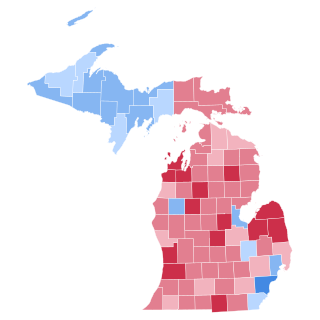
The 1968 United States presidential election in Michigan was held on November 5, 1968. All 50 states and the District of Columbia participated in the 1968 United States presidential election. Voters chose 21 electors to represent them in the Electoral College, who voted for president and vice president.
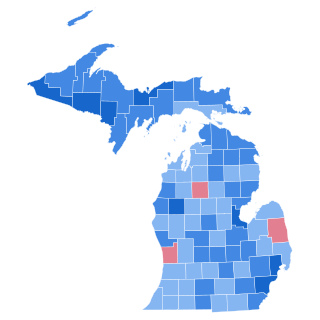
The 1964 United States presidential election in Michigan took place on November 3, 1964, as part of the 1964 United States presidential election. Voters chose 21 representatives, or electors, to the Electoral College, who voted for president and vice president.

The 1940 United States presidential election in Michigan took place on November 5, 1940, as part of the 1940 United States presidential election. Voters chose 19 representatives, or electors, to the Electoral College, who voted for president and vice president.

The 1932 United States presidential election in Michigan took place on November 8, 1932, as part of the 1932 United States presidential election. Voters chose 19 representatives, or electors, to the Electoral College, who voted for president and vice president.
















